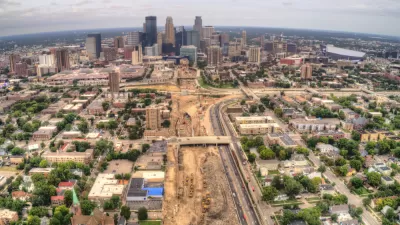Refusing to raise the 20-cent gas tax, creative Texas legislators have devised another scheme to divert existing revenue streams to roads. Last year it was a portion of the Rainy Day Fund. This year, from general sales and motor vehicle sales taxes.
In this KCBD newscast from Lubbock, Texas, managing editor Abner Euresti interviews "Texas House Representative Joe Pickett (D-El Paso), who also serves as the state's chairman of transportation, says taking a portion of the state’s general sales tax would help generate more money for transportation."
He says if passed, this would be the largest amount of money going into transportation in the history of TXDoT. "If Proposition 7 is successful, it means an influx of new money of about $3 billion a year," he says.
According to Move Texas Forward, the group behind last year's wildly successful Prop. 1 (which passed with 80% of the vote and diverted half of the revenue from energy taxes, normally deposited into the state's Rainy Day Fund, to the State Highway Fund), funds for Prop. 7 will come from two sources:
- $2.5 billion would be deposited into the state highway fund from state sales tax revenues above the first $28 billion dollars that year.
- 35% of the net revenue derived from the motor vehicle sales and rental tax above the first $5 billion dollars each year would be deposited into the state highway fund. [According to Ballotpedia, there are three sources, "motor vehicle sales, use, and rental tax."]
"Both Republican and Democratic lawmakers voted for this proposition with 180 out of 181 Texas legislators supporting it," writes
Ballotpedia lists dozens of organizations in support of the measure, and only two opposing it:
The state's 20-cent gas tax, ninth lowest in the nation as of April 1 according to the American Petroleum Institute (PDF), hasn't been raised since 1991.
Hat tip to AASHTO Daily Transportation Update.
FULL STORY: Texas lawmakers propose constitutional amendment for transportation fund

Study: Maui’s Plan to Convert Vacation Rentals to Long-Term Housing Could Cause Nearly $1 Billion Economic Loss
The plan would reduce visitor accommodation by 25,% resulting in 1,900 jobs lost.

North Texas Transit Leaders Tout Benefits of TOD for Growing Region
At a summit focused on transit-oriented development, policymakers discussed how North Texas’ expanded light rail system can serve as a tool for economic growth.

Why Should We Subsidize Public Transportation?
Many public transit agencies face financial stress due to rising costs, declining fare revenue, and declining subsidies. Transit advocates must provide a strong business case for increasing public transit funding.

Alabama: Trump Terminates Settlements for Black Communities Harmed By Raw Sewage
Trump deemed the landmark civil rights agreement “illegal DEI and environmental justice policy.”

Dear Tesla Driver: “It’s not You, It’s Him.”
Amidst a booming bumper sticker industry, one writer offers solace to those asking, “Does this car make me look fascist?”

A Visual Celebration of Manhattan’s Chinatown Elder Community, Through Food
Lanterns, cafeteria trays, and community connection take center stage in this stunning photo essay.
Urban Design for Planners 1: Software Tools
This six-course series explores essential urban design concepts using open source software and equips planners with the tools they need to participate fully in the urban design process.
Planning for Universal Design
Learn the tools for implementing Universal Design in planning regulations.
City of Santa Clarita
Ascent Environmental
Institute for Housing and Urban Development Studies (IHS)
City of Grandview
Harvard GSD Executive Education
Toledo-Lucas County Plan Commissions
Salt Lake City
NYU Wagner Graduate School of Public Service



























